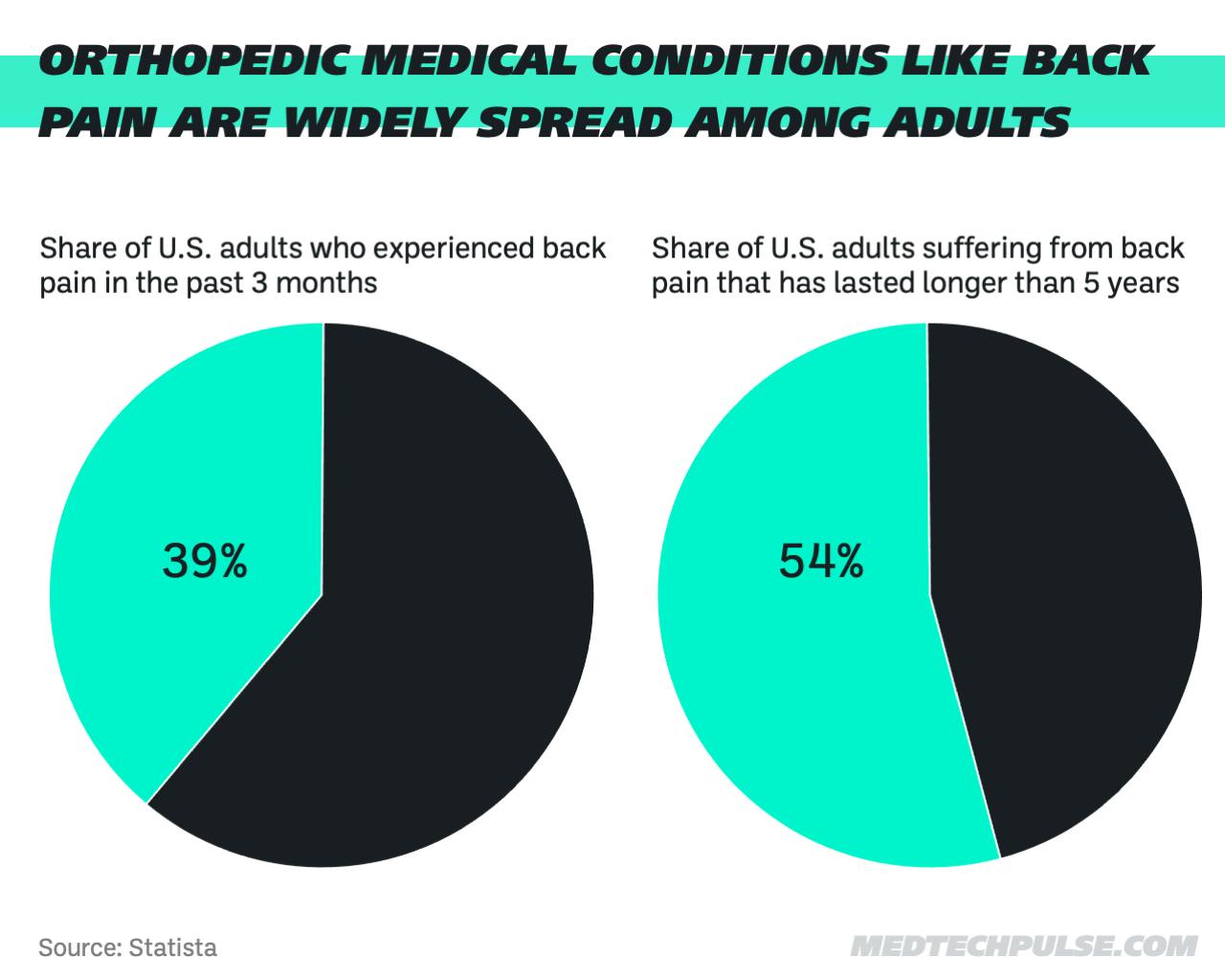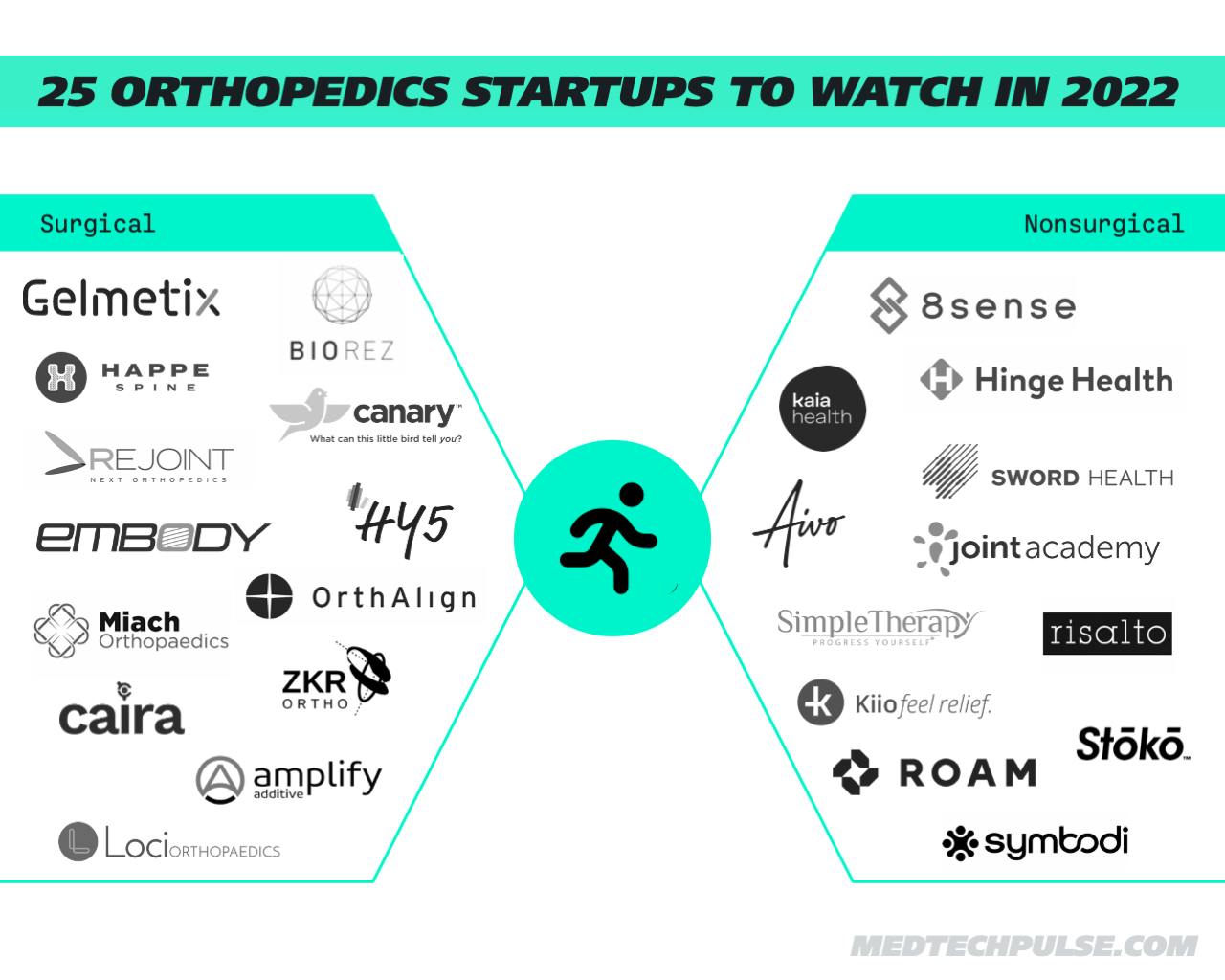25 Orthopedics startups to watch in 2022
When industry experts discuss the most promising innovation in the context of MedTech, they often refer to trends such as telemedicine, or wearable health-tracking—which we report on regularly in The Decentralization of Healthcare.
One medical discipline that only rarely comes to mind when we think of digital innovation is orthopedics. Orthopedics, which refers to the care of the musculoskeletal system—meaning the skeletal system and its interconnected muscles, bones, joints, ligaments, and tendons—is often overlooked in the context of innovation disrupting the medical sector. This is quite tragic, given the fact that orthopedic medical conditions are among the top contributors to chronic pain in adults. Take back pain as an example:
- As of 2019, around 39% of adults above the age of 18 in the United States reported experiencing back pain in the last three months.
- More than half of U.S. adults suffering from back pain have had the condition for five years or longer.

Despite the relevance of back pain and other orthopedic conditions, there has been little talk of more innovative solutions for treating these illnesses.
Fortunately, there is an armada of up-and-coming startups driving the orthopedic discipline forward. This article will present some of the most promising players, including a startup mapping at the end of the piece.
Orthopedic treatment seemed hard to digitize - until startups did it
The main reason for the marked lack of innovation potential in the orthopedics sector is quite obvious. Common conditions treated by an orthopedist—including arthritis, bone fractures, back and neck pain, and congenital conditions like clubfoot—are usually diagnosed through in-office procedures and treated through physical (meaning manual, or non-virtual) therapy such as rehabilitation and exercise programs, injections, acupuncture, mobility aids, and in some cases, surgery.
These treatments seem difficult to “virtualize” in the sense that they aren’t easily outsourced to digital means, as in the case of, for instance, mental health issues. In this space, patients have found excellent treatment in the form of virtual therapy sessions with specialists through dedicated software tools, as well as DIY treatment programs found in mobile apps targeting the condition in question.
Even though orthopedic therapy is harder to digitize than treatments in other medical disciplines, there is plenty of digital innovation taking place in the space today. The past five years in particular have brought many exciting trends to light, among them those proving how digital health can in fact deliver musculoskeletal care.
One example is Sword Health, which raised a gigantic $163 million Series D funding round (based on a $2 billion valuation) last October, by providing at-home therapy pairing therapists through a wearable band. There are many similar players offering pure digital or hardware-app combinations for at-home therapies. Most of these up-and-coming startups share at least one of the following two characteristics:
- They help move treatment out of clinics into patients’ homes. SWORD is one example, along with other heavily-funded players like Kaia health and Hinge Health. The latter just raised $600 million at a $6+ billion-dollar valuation.
- They focus on the prevention of orthopedic conditions, helping to avoid more drastic measures like surgery. This may range from structured exercise programs to patient education that encourages inexpensive, non-operative care over more expensive surgical care. Examples include startups offering posture correction services like 8sense or Upright.
Orthopedic hardware startups are making headlines
The power of innovation and technological transformation on the orthopedics front become even more apparent when looking beyond at-home therapy. From diagnosis to treatment, a lot of technology hardware that has historically already been in place has undergone its own transformation, with up-and-coming startups introducing technologies that advance precision, safety, accuracy, costs, and ultimately, patient healing.
When focusing on the latter part of the patient journey, we find surgical procedures similarly impacted by technology advancements. Most orthopedic surgery procedures such as joining replacements, minimally-invasive procedures for arthroscopic surgery, or even more drastic measures such as spinal fusion are performed through devices and “machinery” equipped with micro-sensors, robotics, and other technology that has the potential to exponentially improve success rates and healing times (often while lowering the total cost of treatment).
Beyond the startups listed above, there is a growing number of startups developing new forms of orthopedics devices—showcasing that radical innovation in the MedTech space is not only focused on conservative treatments and digital solutions.
Especially in the context of orthopedics, with human motion being the focal point, the combination of hardware devices with a direct application to the human body and the use of digital tools, which bring advancements and efficiencies to musculoskeletal diagnosis and treatment, can truly enable disruptive innovation.
Now let’s take a look at three exemplary areas where startups are leading the charge as part of the close to $40 billion global orthopedic device market.
Robotic prosthetics
Robotic prosthesis control is a method for restoring a biologically-accurate gait to a person with limb loss. Pushed forward by the emergence of more powerful, more compact robotic technologies, biomechatronic-based prosthetics have made significant gains over the past few years.
One interesting example of a startup addressing this is hy5. The Oslo-based company actually developed the world's first hydraulically-actuated prosthetic hand. Their goal is to restore mobility and functionality to the daily lives of more than 8 million people worldwide who live with an amputated hand. Soft robotic technologies have tremendous potential to make prostheses very cost-effective, especially for low-income families who have suffered an amputation.
Smart knee applications
Approximately 40% of the global population over the age of 55 suffers from chronic knee pain.
For some patients, exoskeletons can be a non-invasive alternative to surgery. They help to reduce the load and therefore the pain (even though the free movement is only possible with joint replacement).
Roam Robotics, a San Francisco-based robotics company, unveiled a $7,000 fabric exoskeletal knee brace for anyone. The robotic, smart knee orthosis called Ascend actively adapts— meaning it recognizes the body's movements, automatically adjusts to the wearer's needs, and provides precise support to target specific muscle groups. The device is available for pre-order and will ship in late summer this year.
In those cases where knee surgery cannot be avoided, Italy-based Rejoint has developed a cohesive total knee replacement solution using artificial intelligence and 3D printing. Their technology, called YourKnee, produces a knee replacement implant designed for the unique anatomy of the individual patient. The 3D printing technology allows cobalt chrome implants and specialized surgical instruments to be custom-fabricated on-demand—just in time for each patient. During the preoperative phase, YourKnee uses AI tools and algorithms to determine the placement, shape, and size of the implant to ensure the perfect custom fit.
Another example is Canary Medical. The Vancouver-based startup played a pivotal role in performing the first-ever knee replacement surgery using a smart knee implant in October 2021. Called Persona IQ, the knee combines a proven knee implant from industry incumbent Zimmer Biomet (founded in 1927) with Canary’s implantable tibial extension sensor technology, which measures and determines range of motion, step count, walking speed, and other gait metrics. This data is designed to give physicians and patients an accurate view of the recovery process.
Surgical implants
Certain orthopedic conditions are difficult to treat because of smaller or more complicated bones and other structures. An example is thumb base arthritis, a condition that causes persistent pain and renders daily tasks, such as using a phone, quite challenging. Startups are working on implants that mimic the functioning of small joints to address this common need.
The Irish venture Loci Orthopaedics is focused on exactly that. Their implants feature two points of rotation that move together and independently of each other to enable the full range of natural thumb joint movements. Their solution treats a medical condition that impairs the patient’s ability to do simple tasks with the thumb, like turning keys or operating a mobile phone. It enables patients to recover both movement and independence.
Another relevant implant-focused company is the 2014-founded Embody based in the U.S. state of Virginia. The Series B startup is pioneering the next generation of soft tissue healing with novel collagen-based biofabrication techniques and biological products for tissue healing. Specifically, Embody is developing regenerative collagen-based implants that will resorb into the body, improving the outcome for the 2 million-some patients affected by soft tissue injuries in the United States each year.
25 orthopedic startups to watch in 2022
In total, we scouted several hundred startups transforming the orthopedics space as MedTech moves into 2022. What’s particularly promising is that artificial intelligence and machine learning capabilities are increasingly part of these startups’ core offerings. This strengthens our bullish outlook on the startup ecosystem to radically transform the orthopedics space. Most likely, the number of relevant orthopedics startups will continue to grow over the next few years.

Here is our list of startups in the orthopedics space that we find particularly interesting as we enter the new year:
8sense (Posture coach)
Symbodi (Digital MSK care)
Aivo Health (Pain care)
Joint Academy (Digital MSK care)
Sword Health (Digital MSK care)
Kaia Health (Digital MSK care)
Hinge Health (Digital MSK care)
Simple Therapy (Digital MSK care)
Kiio (Digital MSK care)
Risalto (Digital MSK care)
Roam Robotics (Smart orthosis)
Stoko (Knee brace)
Gelmetix (Injectable disk gel)
Happe Spine (Spine implant)
Canary Medical (Smart knee implant)
Amplify Additive (Additive manufacturing)
Rejoint (Personalized kee implants)
Loci orthopedics (Thumb implants)
Embody (Soft tissue healing)
Biorez (Soft tissue healing)
Miach Orthopaedics (ACL restoration)
ZRK Ortho (ACL restoration)
Caira Surgical (Robotic surgery)
OrthAlign (Assisted surgery)